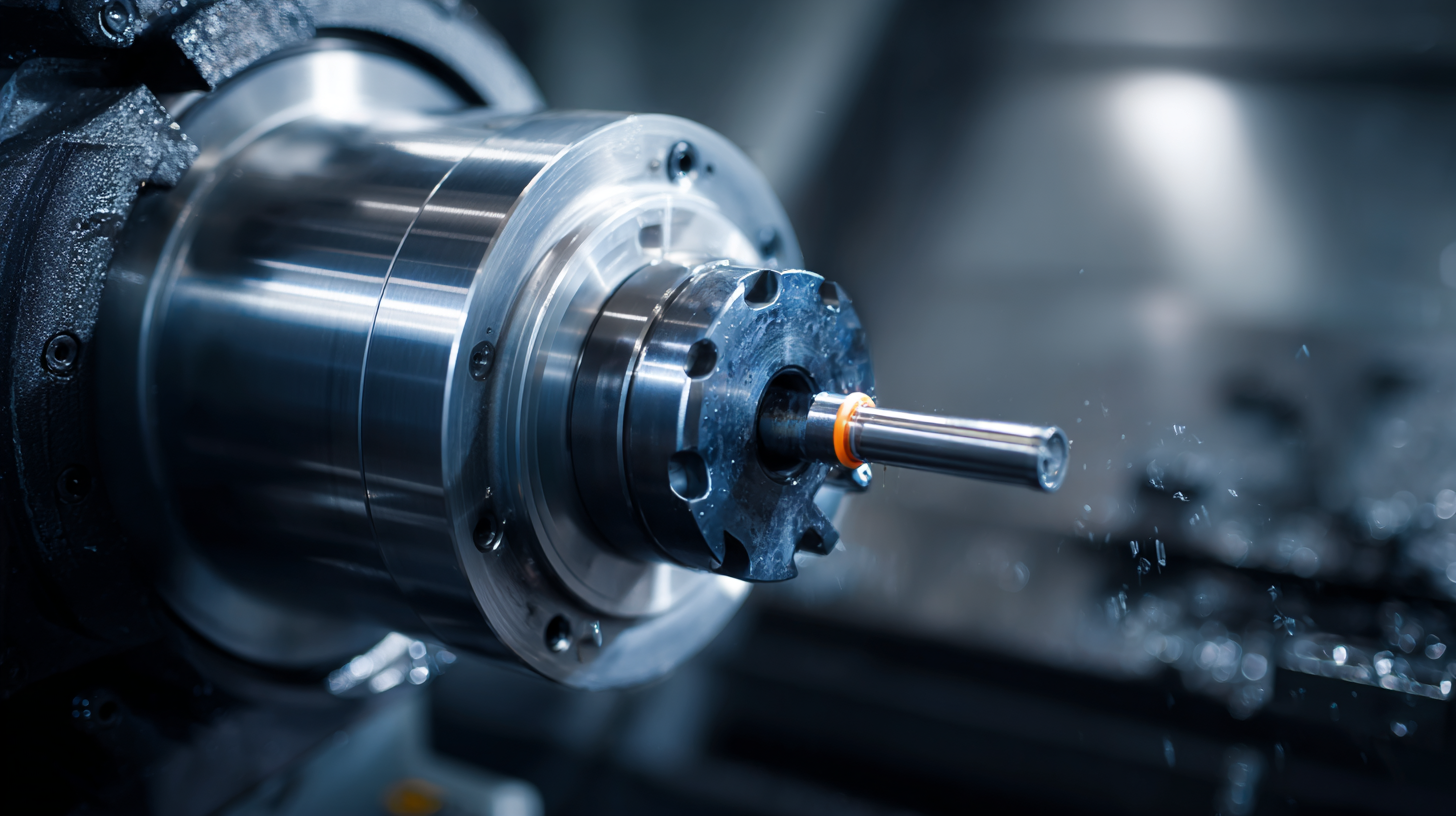Ultimate Checklist for Achieving Best CNC Precision Engineering Excellence
In the rapidly evolving landscape of manufacturing, CNC precision engineering stands out as a pivotal force driving efficiency and quality. According to a recent report by MarketsandMarkets, the CNC machine market is projected to reach $100 billion by 2025, underscoring the critical role that precision engineering plays in meeting the demands of various industries. As companies strive for operational excellence, the need for an ultimate checklist that encapsulates the best practices in CNC precision engineering becomes increasingly significant.

This guideline aims to provide engineers and manufacturers with essential insights and actionable strategies to enhance precision, minimize errors, and optimize production processes, thereby setting a benchmark for excellence in the field. With the rise in automation and the adoption of advanced technologies, mastering CNC precision engineering is not just beneficial; it is imperative for sustaining competitive advantage in today's market.
Importance of Industry-Specific Import and Export Certifications in CNC Precision Engineering
In the field of CNC precision engineering, industry-specific import and export certifications play a crucial role in ensuring quality and compliance. These certifications serve as a testament to a company's adherence to international standards, which can significantly impact their marketability and reputation. For businesses looking to expand their reach globally, obtaining the appropriate certifications not only enhances credibility but also facilitates smoother transactions across borders, ensuring that products meet the required safety and performance standards.

Moreover, specific certifications can open doors to new markets and provide a competitive edge. They often signal to customers that a company emphasizes precision and quality control in its manufacturing processes. This is particularly important in industries such as aerospace, automotive, and medical devices, where the stakes are high, and the margin for error is minimal. By investing in these certifications, CNC precision engineering firms can demonstrate their commitment to excellence, appeal to a broader audience, and ultimately contribute to the advancement of the industry as a whole.
Key Standards for CNC Machinery Certification: ISO 9001 and CE Marking
When it comes to CNC precision engineering, compliance with recognized standards is essential for delivering top-notch results. Key among these standards are ISO 9001 and CE Marking. ISO 9001 sets the framework for a quality management system that ensures companies consistently meet customer expectations and regulatory requirements. This foundation not only enhances operational efficiency but also boosts customer trust and satisfaction, making it a vital component for any CNC operation aiming for excellence.
On the other hand, the CE Marking demonstrates that products meet the essential health and safety requirements set by European Union legislation. It is particularly significant for businesses looking to penetrate markets in regions with stringent regulatory frameworks, such as Europe. As industries such as medical design and manufacturing engage with expanding markets in Mexico, Central America, and South America, understanding the local compliance requirements becomes paramount. Ensuring that CNC machinery meets both ISO 9001 and CE standards can streamline the certification process, paving the way for greater adaptability in global trade while assuring compliance with varied regulatory landscapes.
Ultimate Checklist for Achieving Best CNC Precision Engineering Excellence - Key Standards for CNC Machinery Certification
| Dimension | Standard | Description | Certification Importance |
|---|---|---|---|
| Accuracy | ISO 9001 | Ensures quality management systems are in place to consistently provide products that meet customer requirements. | Critical for maintaining competitive advantage in precision engineering. |
| Safety | CE Marking | Indicates compliance with EU safety, health, and environmental protection legislation. | Essential for market access within the European Economic Area. |
| Reliability | ISO 9001 | Focuses on continuous improvement and monitoring customer satisfaction. | Promotes trust in the quality of products and services. |
| Durability | CE Marking | Certifies products are designed to function safely under normal conditions. | Key for enhancing product lifespan and reducing warranty claims. |
| Innovation | ISO 9001 | Encourages innovative processes that enhance productivity. | Facilitates alignment with technological advancements. |
Impact of Non-Compliance: Financial and Operational Risks in CNC Engineering Exports
In the realm of CNC engineering exports, non-compliance with industry standards can have far-reaching financial and operational risks. According to a report by the International Organization for Standardization (ISO), compliant organizations experience 20% fewer operational interruptions than their non-compliant counterparts. This is crucial for CNC manufacturers aiming to penetrate competitive markets, particularly in regions like Iran, where trade dynamics heavily focus on sectors such as agriculture and healthcare. Non-compliance can lead to costly delays, penalties, and a tarnished reputation—all of which directly impact profitability.
Additionally, failure to adhere to stringent CNC precision engineering standards can worsen the situation. As highlighted in a recent study by the Global Manufacturing Alliance, companies that implement strict quality controls see a 30% reduction in product defects. This aligns with the necessity for exports, especially in sensitive sectors like healthcare, where precision is paramount. In a market where trust is critical, adhering to these standards not only safeguards financial assets but also enhances long-term operational viability in an ever-evolving economic landscape. Businesses looking to export to regions such as Iran must prioritize compliance to mitigate risks associated with non-compliance effectively.
An Overview of Regional Certification Requirements for Global CNC Markets
In the global CNC precision engineering market, understanding regional certification requirements is crucial for manufacturers seeking to maintain a competitive edge. Different regions, from North America to Europe and Asia, impose specific standards that must be met to ensure product quality and safety. For instance, ISO certifications are often recognized internationally, but local certifications may also be required to comply with regional regulations.
Companies operating in multiple markets must navigate these complex requirements to avoid costly delays and ensure their products meet local demands.
Moreover, adhering to certification standards not only facilitates entry into diverse markets but also enhances the credibility of a manufacturer. Certifications such as the CE marking in Europe or the FDA approval in the United States can significantly influence customer confidence. Organizations can leverage these certifications to distinguish themselves in the crowded CNC landscape. Therefore, staying informed about the latest regional certification updates is essential for businesses aiming to achieve excellence in CNC precision engineering globally.
Best Practices for Navigating the Certification Process in CNC Manufacturing
Achieving excellence in CNC manufacturing requires a solid understanding of the certification process, which often serves as a benchmark for quality and precision. One of the best practices to navigate this journey is to familiarize oneself with the specific certification standards relevant to the CNC industry, such as ISO 9001 or AS9100. These standards outline rigorous quality management principles that not only enhance operational efficiency but also boost customer trust. Engaging with these standards early on allows manufacturers to systematically identify gaps in their processes, ensuring a smoother path toward certification.

Another crucial practice is to establish a robust internal audit system. Regular audits help identify non-conformities and provide insights into areas that need improvement. This proactive approach not only keeps teams aligned with certification requirements but also fosters a culture of continuous improvement within the organization. Additionally, investing in employee training ensures that everyone involved in CNC processes is equipped with the necessary skills and knowledge to uphold quality standards. By prioritizing these best practices, manufacturers can effectively traverse the certification landscape, paving the way for enhanced precision engineering excellence.
